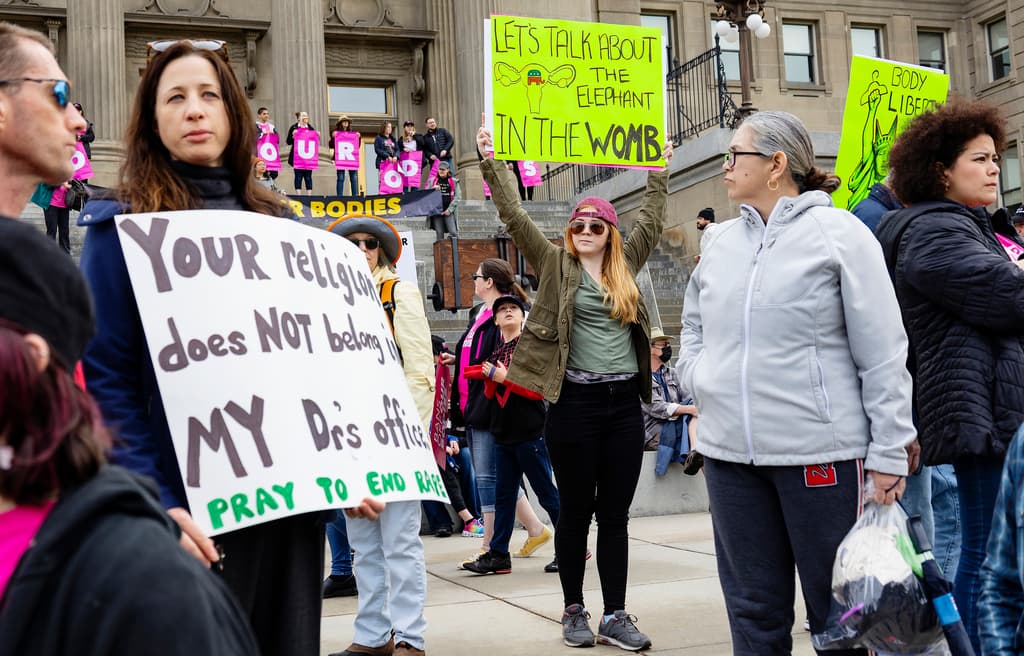Supreme Court Temporarily Allows Emergency Abortions in Idaho Case Testing Balance of State and Federal Power
The justices sent the case back to the lower courts.

In a temporary win for the Biden administration, the Supreme Court has held that Idaho hospitals are required to perform emergency abortions to protect the health of mothers for now as the justices send the case back to lower courts to weigh it on the merits.
At issue in the case, Moyle v. United States, was whether a federal law requiring emergency room doctors to perform “necessary stabilizing treatment” at hospitals accepting Medicare includes abortion and preempts an Idaho state law, the Defense of Life Act, largely banning the procedure. It was the second major abortion case of the term, and comes only two weeks after the justices unanimously ruled to preserve widespread access to abortion drugs.
Yet, in a 6-3 split, the majority dismissed the case as granted.
Idaho’s arguments “do not justify, and have never justified, either emergency relief or our early consideration of this dispute,” Justice Elena Kagan — joined by Justice Sonia Sotomayor and Justice Ketanji Brown Jackson — wrote, noting that the lower courts can now proceed with litigation and that a district court’s order requiring hospitals to perform emergency abortions will now take effect again.
“That will prevent Idaho from enforcing its abortion ban when the termination of a pregnancy is needed to prevent serious harms to a woman’s health.” Justice Amy Coney Barrett, Justice Brett Kavanaugh, and Chief Justice Roberts wrote a separate concurrence.
On Wednesday, Bloomberg reported that a draft of the opinion had temporarily been released on the Supreme Court’s website, indicating that the justices would side with the Biden administration. The court’s public information officer, Patricia McCabe, told the outlet that the “Court’s Publications Unit inadvertently and briefly uploaded a document to the Court’s website.”
In a dissent, Justice Samuel Alito — joined by Justice Clarence Thomas and in part by Justice Neil Gorsuch — writes that the “decision is puzzling” and that he “cannot endorse this turn of events.”
“Having taken the unusual step of granting certiorari before Idaho’s appeal could be heard by the Ninth Circuit, the Court decides it does not want to tackle this case after all and thus returns the appeal to the Ninth Circuit, which will have to decide the issue that this Court now ducks,” he wrote.
The case posed critical questions about the balance of state and federal power following the end of Roe v. Wade, and is expected to be closely watched by nearly two dozen states with laws restricting abortion.
“There are 22 states with abortion laws on the books,” the attorney representing Idaho, Joshua Turner, told the court in April. “This isn’t going to end with Idaho,” he said, adding that “this question is going to come up in state after state.”
During oral arguments in April, Idaho argued that the Supreme Court’s decision overturning Roe left abortion to the states, while the Biden administration said the 1986 federal emergency medicine law trumps state laws in the area of emergency treatment that includes the health of the mother, as the Sun reported.
Idaho’s abortion law, which automatically went into effect following Dobbs v. Jackson Women’s Health Organization, criminalizes abortions except when a doctor decides in “good faith medical judgment” that the abortion is medically necessary “to prevent the death of the pregnant woman,” but doesn’t specify cases where the mother’s health is at risk. The Supreme Court allowed Idaho to enforce the abortion law while it weighed the case, overturning a lower court order preventing it.
“For some pregnant women suffering tragic emergency complications, the only care that can prevent grave harm to their health is termination of the pregnancy,” the Justice Department’s brief noted. “In those circumstances, EMTALA requires participating hospitals to offer such care — yet Idaho law forbids it.”
Idaho, for its part, argued the Biden administration is attempting to “reimpose a federal abortion requirement, this time through the exercise of raw executive power.” Idaho maintained that the federal emergency law, which “explicitly promises in four places protection for an ‘unborn child,’” has the same goal as Idaho’s law to protect life.

